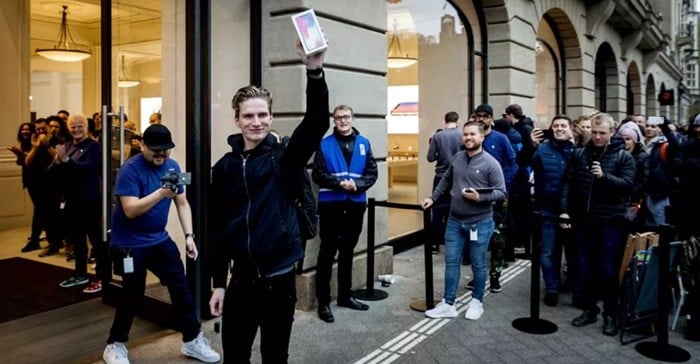The real story behind the huge crowds gathered at iPhone launches

But what sounds like a question for psychologists, may actually be better addressed as a matter of the way media and markets work.
You’d be forgiven for expecting this article to be a rant about the blatant consumerism of the people that stand in line – many overnight – to get the latest iPhone. Or against the world’s obsession with smartphones more generally. After ten years of extensive media coverage of each launch, we’ve all grown used to the clichéd pictures of “die-hard fans” queuing outside Apple stores.
At the same time, marketing experts celebrate Apple for its seemingly magical ability to electrify the masses and mobilise thousands of people to line up for days. It has become a custom among admirers and critics alike to compare the relationship between Apple and its loyal customers with religions and mystical cults. What we are told is a story of powerful symbols and an idolised brand on one side, meeting irrational lemmings on the other.
Yet, there is also evidence suggesting that iPhone queues may be the result of something much more banal than the “mythical power of symbols, icons and stories”. And what if iPhone queuers weren’t irrational hedonists, but were acting more like calculating entrepreneurs?
Jumping on the bandwagon
Many people in queues are actually earning money rather than spending it. People with prime spots can sell them for hefty amounts of money. Over the years, a whole business of line sitters has emerged. Affluent buyers can use platforms such as Airtasker to find people who are willing to queue for them, reportedly at weekly rates of US$3,400 in top locations like New York.
Even charities have discovered iPhone queues as a way to raise funds, expecting to sell their places at the head of the queue for four-figure sums.
What’s more, one of the reasons for the high prices paid for good spots is that iPhone buyers compete with companies and entrepreneurs seeking to benefit from the presence of media reporters covering these launches.
The first person to queue for the recent iPhone 8 and X – a few weeks ago in Sydney – was a 20-year old YouTuber planning to document the event. Certain to receive worldwide media attention as the first “fanatic” in the queue, he knew that this would be a unique opportunity to enjoy free publicity and grow his subscriber base. For publicity seekers like him, being the first to own the iPhone is clearly secondary.
The young YouTuber is far from alone. The observations of a journalist who participated in an iPhone queue in 2013, give an impression of the scale of this phenomenon:
The number of other brands couriering free food was unlike anything I’ve ever seen. Food from Greggs, Dominos, Nandos, Subway was shipped in. A drinks company had sent round two crates of their product. All in the hope that a press photographer would snap the queuers consuming their produce.
More than meets the ‘i’
Clearly, people like the ones described above have little in common with the picture of self-indulgent and irrational consumers that the media have instilled in us over the years. Quite the opposite. It appears that a substantial amount of people line up precisely because of the huge media attention that iPhone queues receive.
Instead of wondering about the mental state of the few thousand people queuing for an iPhone, we might instead ask why millions of people around the world have an apparent desire to engage in this annual ritual of passionate iPhone queue-bashing. If there is something we can learn from the phenomenon of iPhone queues at all, then it is that the critics far outnumber the blind followers of fashion.
The irony of course is that critics are equally blind to the varied motivations among iPhone queuers, perpetuating the misleading – but nevertheless common – perception that we are surrounded by people hopelessly obsessed with owning the latest and greatest product. All the while, the onus of responsibility for the environmental and societal implications of rapidly rising levels of waste, is entirely placed on consumers.
Of course, the biggest beneficiary of all of this: Apple inc.
Source: The Conversation Africa

The Conversation Africa is an independent source of news and views from the academic and research community. Its aim is to promote better understanding of current affairs and complex issues, and allow for a better quality of public discourse and conversation.
Go to: https://theconversation.com/africa























